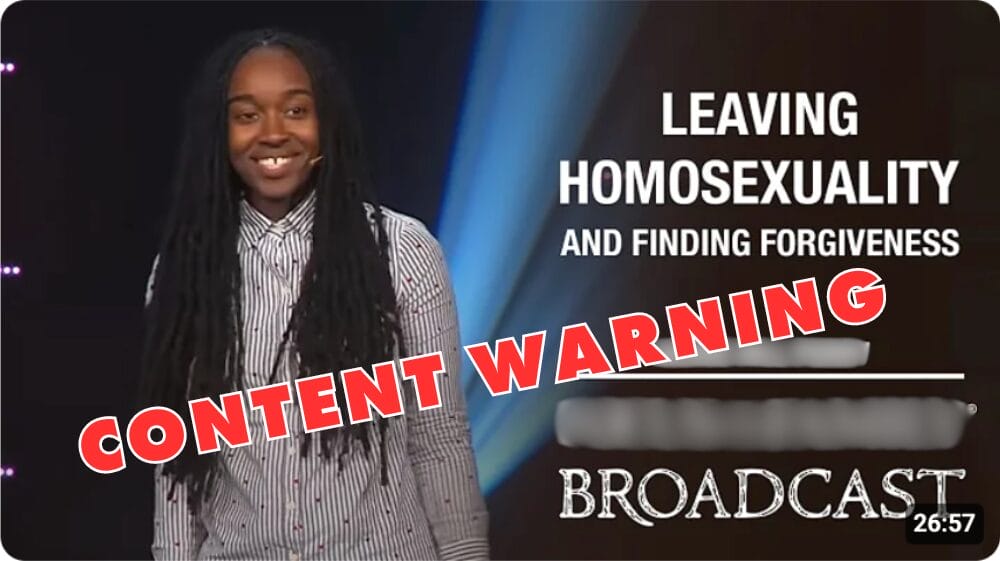Alternate “Conversion Therapy” Phrases: “Leave Homosexuality”
This entry is part of the GLAAD Guide to Anti-LGBTQ Online Hate and Disinformation, an ongoing project to identify some of the most prevalent and egregious terms, tropes, and concepts that are used to harass, attack, and spread malicious misinformation about LGBTQ people on social media. Learn more here.
*CONTENT WARNING*
The example below includes a hateful term, phrases and imagery.
“Leave Homosexuality”

“Leave homosexuality or leaving homosexuality” are phrases that promote the harmful and discredited practice of “conversion therapy,” which falsely claims to change an LGBTQ person’s sexual orientation, gender identity, or gender expression. “Conversion therapy” has been condemned by all major medical, psychiatric, and psychological organizations, including the American Medical Association and American Psychological Association. And there is a growing movement to ban “conversion therapy” around the world. As of August 2024, 16 countries have such bans, including Canada, France, Germany, Malta, Ecuador, Brazil, Taiwan, and New Zealand. In the United States, 23 states and the District of Columbia have restrictions in place.
As noted in a 2024 Global Project Against Hate & Extremism (GPAHE) report (Conversion Therapy Online: The Ecosystem In 2023), search engines and platforms are failing to adequately reduce the circulation of harmful anti-LGBTQ “conversion therapy” material and providers, and they must urgently implement new solutions. GLAAD is actively working to urge these companies to better mitigate and moderate this content, as well as driving thought-leadership in the field with reports such as this one: All Social Media Platforms Should Have Policy Prohibitions Against Harmful So-Called “Conversion Therapy” Content. The GLAAD Media Reference Guide further explains that: “Some practitioners of conversion therapy are licensed mental health professionals who exploit their credentials to take advantage of vulnerable families and youth. Others are affiliated with religious organizations and may frame their abusive practices as ‘pastoral care’ rather than psychology. These organizations often target parents and LGBTQ people on social media.” Explore more via GLAAD’s Guide to Anti-LGBTQ Online Hate and Disinformation.
Conclusion
This is just one example of anti-LGBTQ online hate and disinformation. Every term and concept should be evaluated in context. For instance, LGBTQ people and allies may use hashtags with hate terms as counterspeech, or slurs such as “tranny” or “dyke” may be used self-referentially to reclaim them. This guide will be updated on an ongoing basis. Please see the latest GLAAD Social Media Safety Index report for a deeper exploration of the current social media landscape for LGBTQ people, including GLAAD’s recommendations and thought leadership in the field.
How to Report Anti-LGBTQ Online Hate Speech and Harassment
Every major social media platform has policies which prohibit hate and harassment on the basis of protected characteristics, including sexual orientation and gender identity. To learn how to report potentially violative content, check out GLAAD’s LGBTQ Digital Safety Guide, which includes basic tips on helping our community be more safe online.
About the GLAAD Social Media Safety Program
As the leading national LGBTQ media advocacy organization, GLAAD is working every day to hold tech companies and social media platforms accountable and to secure safe online spaces for LGBTQ people. The GLAAD Social Media Safety Program produces the highly-respected annual Social Media Safety Index (SMSI) and researches, monitors, and reports on a variety of issues facing LGBTQ social media users — with a focus on safety, privacy, and expression.












